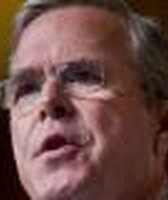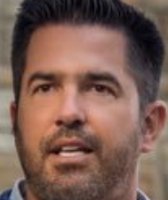Stand up for the facts!
Our only agenda is to publish the truth so you can be an informed participant in democracy.
We need your help.
I would like to contribute

Former Florida Gov. Jeb Bush speaks to the media after addressing current Florida Gov. Rick Scott's Economic Growth Summit on June 2, 2015, in Orlando.
Jeb Bush says 1.3 million jobs were created in Florida during his tenure -- more than Texas
At an event in Orlando attended by several GOP presidential contenders, former Florida Gov. Jeb Bush, a likely Republican candidate, touted his state’s record on job creation during his tenure.
"In Florida, during my eight years, we grew at 4.4 percent per year, and we created, together, many of the people in this room, by creating a better environment, we created 1.3 million net new jobs -- more jobs created than Texas, more jobs created than any state in country other than California, a state 2 1/2 times our size," Bush said.
That’s a direct knock at one of his likely rivals in the presidential race -- former Texas Gov. Rick Perry, who also spoke at the summit and is expected to announce his candidacy for president later this week.
We decided to look at the number of jobs created in Florida and Texas, respectively, and how much credit Bush deserves for that. Bush was governor from January 1999 through January 2007; Perry was governor from late 2000 to early 2015.
Net jobs in Florida vs. Texas
Bush’s term in office was bookended by two periods of robust job growth -- 1998-2000 and 2004-06. The 2007 recession hit after he left office.
Bush’s spokesman pointed to data from the Bureau of Labor Statistics for total, nonfarm, seasonally adjusted jobs. In Florida, there were about 6.7 million such jobs in December 1998 and 8 million in December 2006. That works out to about 1.3 million net new jobs.
By comparison, in Texas, there were about 9.1 million jobs in December 1998 and 10.2 million jobs in December 2006. That works out to 1.1 million net new jobs.
So during Bush’s two terms in office -- which, we’ll note, includes a period before Perry was governor -- the number of net new jobs in Florida was 186,800 higher than in Texas.
Does Bush get credit for the job growth?
Bush took a measure of credit during his speech. And on his PAC’s website, Bush also took credit for growth saying that "his limited-government approach helped unleash one of the most robust and dynamic economies in the nation, creating 1.3 million net new jobs ... ."
Is that justified?
We started by asking his spokesman if he could point to anything that Bush did to fuel that job growth.
"Creating 1.3 million new jobs and leading the nation in job creation over your final five years in office doesn’t just happen by riding an economic wave," Matt Gorman said. "That takes strong, pro-growth economic policies like those put in place by Gov. Bush. He consistently improved Florida's business climate, including cutting taxes every year he was in office."
PolitiFact has frequently noted that when it comes to the economy and jobs, assigning credit (or blame) for a given statistical accomplishment isn’t as clear cut as politicians would like voters to believe. Much has to do with timing: Bush was fortunate to have governed during some economically robust years.
"It is very hard to measure how much credit Gov. Bush should get for the job creation in Florida during his eight years, since so many different factors affect a state's job creation," George Washington University economist Tara Sinclair said.
Featured Fact-check
Sean Snaith, the director of the University of Central Florida's Institute for Economic Competitiveness, compared the state’s economy to an omelet with many ingredients going into the final product.
Snaith said it’s "difficult to point to one specific ingredient as being responsible for the omelet itself. Florida’s economy performed very well during this time period, the economic omelet was quite tasty. Not all of the ingredients, however, originated in Tallahassee’s kitchen. Low interest rates and a global thirst for oil impacted these state’s economies but neither had any control of these important ingredients."
Moody’s economist Kwame Donaldson added that in the early 2000s, Nevada and Arizona experienced a similar growth trajectory as Florida, suggesting that Bush’s policies were not singularly responsible for his state’s growth. (Arizona, for instance, had a Democratic governor for the second half of the period in question.)
Construction fueled Florida’s job growth -- and then bust
The experts added that it’s worth looking at what happened after Bush left office.
Texas’ job growth during that time frame was also relatively strong – a 19.6 percent increase in Florida vs. a 12.5 percent increase in Texas. Both states were higher than the 7.6 percent for the country as a whole over that period, said David Cooper, an expert on state labor markets at the Economic Policy Institute.
Construction employment in Florida grew by 46.6 percent over that time frame -- more than double the growth in Texas and the nation.
Then, when the recession hit, the construction job market in Florida nosedived. As a result, "Florida’s job losses were much more severe than in Texas," Cooper said.
"I am not sure that the job growth during Jeb Bush administration should be celebrated, because it was primarily fueled by a housing bubble that burst as Bush’s term was ending," said Donaldson of Moody’s. "Florida is still struggling to recover from this housing bust."
Sinclair concurred. "Although it makes more sense for a governor to compare across states in order to somewhat control for national level events, it would also be fair for him to take some of the blame for the worse performance of Florida so soon after he left office if he wants to take credit for the good times," she said.
Texas, by contrast, was not as hard hit because it had stronger bank regulation, meaning it didn’t have as many bad loans as Florida, said Dean Baker, co-director of the Center for Economic and Policy Research. As The Economist explained in 2010, "Texas has strict rules on home-equity lending, relative to other states, and this has helped to prevent ratios of loan size to home value from rising as high as they have elsewhere."
Residential construction fell by about two thirds in Texas, but it collapsed by even more -- 85 percent -- in Florida, said Moody’s senior economist Chris Lafakis.
"I certainly wouldn’t blame only Gov. Bush for Florida’s recession — there were many culpable parties that overlooked and underestimated the effect of horrific lending standards and bad mortgages — but Gov. Bush certainly didn’t prevent or mitigate the recession either," he said. "Vermont is an example where state policy restricted the housing boom but prevented the housing bust."
It’s also worth noting that the sheer number of new jobs doesn’t say much about how well they paid, said Harry Holzer, a Georgetown University economist who is a visiting fellow at the Brookings Institution.
"Texas and Florida are both places that get a big influx of migrants either from other states or immigrants from other countries and I think they drive a lot of job creation in both places, often low-wage job creation," Holzer said.
Our ruling
Bush said that during his eight years in office, "we created 1.3 million net new jobs, more jobs created than Texas."
He got his numbers right, but it’s worth noting that no governor is solely, or even mostly, responsible for economic growth in their state -- and if he wants to take credit for the expansion on his watch, then he also needs to shoulder some of the blame for the bust that followed his departure from office.
The statement is accurate but needs clarification or additional information, so we rate it Mostly True.
Our Sources
Former Gov. Jeb Bush’s Right to Rise PAC video, "Undisputed jobs champ," June 2, 2015
Bureau of Labor Statistics, State and metro area employment for Florida and Texas, December 1998-December 2006
Miami Herald, "Bush defends his conservative credentials ahead of CPAC," Feb. 27, 2015
Tampa Bay Times, "What you don’t know about Jeb Bush’s economic record," May 1, 2015
Reuters, "How Jeb Bush’s big bet on Florida’s economy may come back to haunt him," March 2, 2015
PolitiFact Texas, "Rick Perry and Texas job gains," June 2, 2015
PolitiFact Texas, "Rick Perry says Texas gained a million jobs while nation lost 400,000" , Jan. 22, 2015
Interview, Matt Gorman, Former Gov. Jeb Bush’s Right to Rise PAC spokesman, June 2, 2015
Interview, Lucy Nashed, Former Gov. Rick Perry spokeswoman, June 2, 2015
Interview, Gary Steinberg, Bureau of Labor Statistics spokesman, June 2, 2015
Interview, David Cooper, Economic Policy Institute economic analyst, June 2, 2015
Interview, Harry Holzer, Visiting Fellow in Economic Studies at the Brookings Institution while on leave from Georgetown University., June 2, 2015
Interview, Sean Snaith, director of the Institute for Economic Competitiveness at the University of Central Florida, June 2, 2015
Interview, Dean Baker, economist with the Center for Economic and Policy Research, June 2, 2015
Interview, Tara Sinclair, George Washington University associate professor of economics, June 2, 2015
Interview, Bill Seyfried, Rollins College economist, June 2, 2015
Interview, Kwame Donaldson, Moody’s economist, June 2, 2015
Interview, Chris Lafakis, Moody’s senior economist, June 2, 2015
Browse the Truth-O-Meter
More by Amy Sherman
Jeb Bush says 1.3 million jobs were created in Florida during his tenure -- more than Texas
Support independent fact-checking.
Become a member!
In a world of wild talk and fake news, help us stand up for the facts.




































